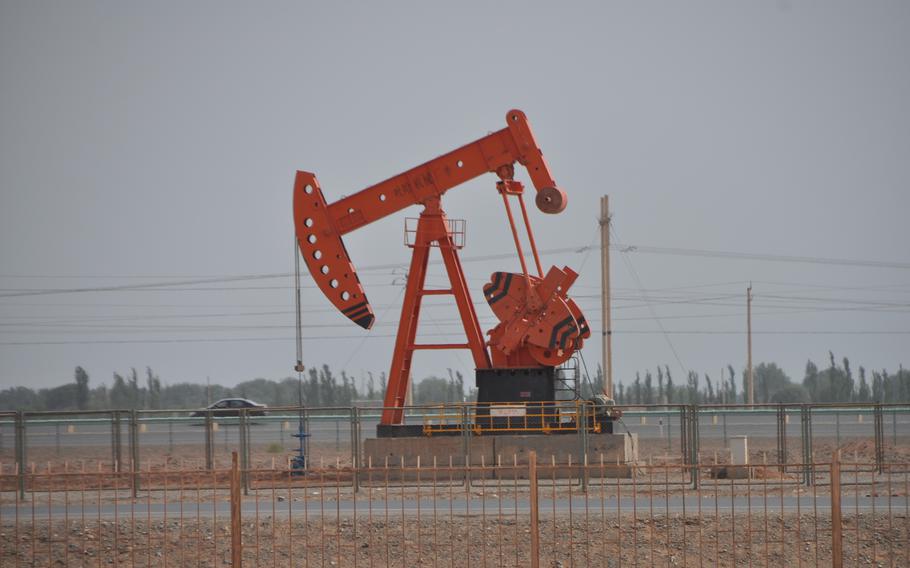
Tuha Oil Field, Turpan, Xinjiang, China (Wikimedia Commons)
Washington’s hawks are demanding that President Joe Biden’s administration tighten U.S. sanctions on Iran as punishment for its support of Hamas, the militant group behind the attacks that triggered the current conflict with Israel. Tehran, they argue, has been exporting more oil over recent months than it has in years.
But fresh measures and tougher enforcement will struggle to curtail the Islamic Republic’s key source of income — thanks to China’s appetite for discounted crude, and what traders, analysts and oil industry executives describe as expanded payment and transport networks that the U.S. cannot reach.
Following former President Donald Trump’s departure from a key nuclear deal in 2018, Tehran had to contend with a U.S. campaign of “maximum pressure”, which sought to force it to abandon uranium enrichment and cut off aid for proxy militias. Washington threatened sanctions against countries which did not reduce Iranian oil to “zero”.
But over the last three years, even accounting for some underreporting after 2018, oil shipments have steadily climbed, thanks to easing US pressure and Chinese demand. Iran is once again closing in on the number-three spot among producers in the Organization of Petroleum Exporting Countries, and the vast majority of its barrels — well over 90% — are heading to the world’s second-largest economy.
US Treasury Secretary Janet Yellen said early in the war that new measures against Iran were possible. Despite the inflationary risks that would come with squeezing Russia and Iran simultaneously while heading into an election, Biden may well have to crank up the heat. What’s less clear is whether Washington can actually do much to counter the effect of China’s support.
“The trade is very sophisticated, with multiple middlemen, which makes it a lot more difficult for the U.S. to sanction. The U.S. can hit companies that are more public or obvious in their Iranian dealings, but many of these middlemen are small entities,” said Homayoun Falakshahi, senior oil analyst at data and analytics group Kpler.
“It’s hard to know who to go after. The U.S. can sanction teapot refiners and even national oil companies like Sinopec, but that’d create more of a political issue amid already tense relations.”
Financial and trade sanctions have become an increasingly important foreign policy tool as countries seek to influence opponents without military force. Yet both Iran and Russia have provided fodder for critics who argue that even unprecedented measures have failed to change behavior, as oil revenue continues to flow to the very top. Targets adapt too. The problem is to some extent time — the impact of sanctions is rarely immediate — and the difficulty in influencing autocratic regimes. It’s also about enforcement.
Over the past weeks, U.S. authorities have blacklisted several UAE companies over their dealings with Russia, and sanctioned two tankers and shipowners over the violation of the oil price cap imposed by the Group of Seven nations. Yet while these measures have caused unease across the oil community, traders say they will not derail crude trades as other players — including dozens, even hundreds in the so-called “dark fleet” — remain in business, illustrating the limits of Washington’s reach.
So too when it comes to Iran and China — and with years of additional experience.
Sanctions on firms in Singapore and Malaysia earlier this year for their roles in allegedly facilitating the sale and shipment of millions of dollars worth of petroleum and petrochemicals on behalf of a company with known connections to Iran did little to dent trade with the ultimate destination, China — which only rose.
“The trade with China is probably something the U.S. would struggle to entirely shut down,” said Raffaello Pantucci, a senior fellow at the S. Rajaratnam School of International Studies in Singapore. “They could put more pressure on Chinese companies if they focus investigations, determine links and extend the range of sanctions. But they’ve extended quite a few sanctions to various Chinese entities already.”
Beijing has long used smaller financial institutions like Bank of Kunlun — a key Chinese conduit for transactions with Iran — to facilitate this commerce and limit the exposure of larger entities with international business links.
More recently, Chinese importers have benefited from the development of a yuan-based alternative to Western clearinghouses — a platform known as CIPS, Cross-Border Interbank Payments System, launched by the central bank to settle international claims.
On the logistical front, there is the expansion of the dark fleet of often-older vessels carrying oil from sanctioned regimes to global customers, leaving buyers like China with options. Today, including Russian tankers and those willing to load Urals and other grades, it has expanded to about 600 ships.
“If you find a middleman and decide to go harsh, they’ll go out of business. But many of these firms are shell companies with fake offices,” said Kpler’s Falakshahi. “The same people can easily set up another new company in one or two months. The impact will be temporary.”
Michal Meidan, director of the China Energy Programme at the Oxford Institute for Energy Studies, points to China’s use of tools like the digital yuan and the dark fleet as a “lifeline to producers”.
China’s relationship with Iran is not without issues. There is less to a 25-year strategic pact agreed in 2021 than meets the eye. There is also the question of how dealings with Tehran would affect any rapprochement between Washington and Beijing, especially if a meeting between the two leaders takes place next week. But for its part Iran has few options for its oil besides China, even with Russia cozying up — and Beijing has every reason to take advantage.
And the longer it does so, the easier the trade becomes, as financial and logistical networks adapt.
With assistance from Sarah Chen.